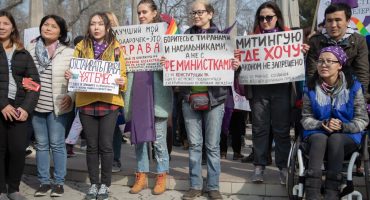Contacts between officials and the media, at least in Kyrgyzstan, are not always peaceful. It happens that public officers of various levels and members of parliament hinder the work of journalists and insult them.
For example, Member of Parliament Tazabek Ikramov, just like some of his colleagues, does not like to communicate with journalists. Particularly, when media representatives ask embarrassing questions.
In 2018, Ikramov called the journalist of Sputnik agency “kelesoo” (“idiot”, “stupid” from Kyrgyz) in a phone talk. This is how the parliamentarian reacted to the fact that he was filmed on the video when his driver was squabbling with the traffic police officer who stopped him for traffic rules violation.
“I was not taking part in the incident, why was I filmed then? Why are you doing like this? Humane people, even if they know someone is guilty, would never talk about it… You are an idiot!” the media quoted the Member of Parliament.
The MP was never held liable for his words.
In August 2018, an officer of the Bishkek Mayor’s Office, Rustam Beishenaliev, said rude things to the journalist of OTRK. Correspondents of the Ala Too 24 programme asked the official to give a comment about the situation with the demolition of illegal structures. After the repeated requests of the female journalist, he said, “Don’t try to find it out! Put the microphone away. First change your skirt to trousers, and we’ll talk then.” The journalist posted the video with the incident on her page in the social media, and the official was fired.
In 2019, the authorised representative of the government in Chui region, Tuigunaaly Abdraimov, insulted the female employee of AKIpress by saying that he would not answer the question because he “did not like her face.” He refused to apologise for his insulting words. Moreover, the official later said he did not feel sorry for his behaviour.
The CABAR.asia Media School together with the lawyer of the Institute Media Policy, Altynai Isaeva, prepared the information cards that would help journalists avoid such situations according to the rightful principles of relations between journalists and officials.
It surely does. Freedom of information is a constitutional right of every citizen of Kyrgyzstan – not only journalists. Article 33 of the Constitution reads that everyone has a right to “freely seek, obtain, store, use information and distribute it verbally, in writing, or otherwise.” Everyone has a right to get information about the operation of state bodies, local governments and their officers, legal entities with participation of state bodies and local governments, as well as organisations financed by the republic and local budgets.”
Moreover, according to the Basic Law, the media “have the secured right to obtain information from state bodies and local governments.” In other words, the state guarantees a journalist the free acquisition and distribution of information from officials.
In fact, they cannot. According to the law of the Kyrgyz Republic “On the mass media”, a journalist is entitled to be accepted by an official when they perform their professional journalistic duties.
During such a meeting, a media officer may take records, including with the help of necessary technical means. However, the law explicitly defines that journalists may take a record, photo and video record only with the respondent’s consent.
It depends. In general, the order of use of a facial image is set forth in article 19 of the Civil Code of the Kyrgyz Republic “Right to an image”. It reads that “no one may publish and distribute a published facial image (picture, photo, motion picture, etc.) without the person’s consent.”
However, consent is not required:
- When publishing and distribution of an image is required by court, bodies of inquiry and investigation;
- When a photo is made or an image is captured otherwise in a public place;
- If the person represented posed for a fee.
However, officials and civil servants are put into the category of public persons by the law of Kyrgyzstan.
However, the media may criticise officials regarding performance of their duties, which is required to ensure their public and responsible discharge of their duties.
Besides, the law of the Kyrgyz Republic “On protection of professional activity of a journalist” explicitly defines that a journalist should have full access to information of public concern, affecting the rights, liberties and legal interests of citizens.
In other words, photo and video recording can be a justified act if a civil servant is recorded during performance of their duties, or if their image was published due to their offence against law.
According to the order of the plenum of Supreme Court of the Kyrgyz Republic “On judicial practice of settling disputes on protection of honour, dignity and business reputation”, public figures are persons who hold public posts and/or use public resources. And also all those who play a significant role in the public life (in politics, economy, arts, social sphere, sports or any other sphere).
In fact, he/she does not. No one may demand that a journalist should get preliminary approval of their messages and materials, as well as demand to amend the text or withdraw the material or message from publication (air). Such actions of a public servant may be deemed as media censorship, which is prohibited by law of Kyrgyzstan.
You can try to explain to a public servant that he/she must provide information to the journalist according to the law.
If the official insists on their decision, in other words, refuses illegally and groundlessly to provide information, hinders the recording for no good reason, you can complain about him/her to the superior official or lodge a complaint with a court in administrative proceedings.
Title photo: 24.kg
This publication was produced as part of the mentorship programme under the Development of New Media and Digital Journalism in Central Asia project delivered by the Institute for War and Peace Reporting (IWPR) with support from the UK Government. It does not necessarily reflect the official views of IWPR or the UK Government
If you have found a spelling error, please, notify us by selecting that text and pressing Ctrl+Enter.





